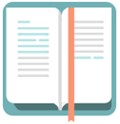
According to the American Library Association, “Information Literacy is a set of abilities requiring individuals to recognize when information is needed and have the ability to locate, evaluate, and use effectively the needed information.” To be information literate, then, one needs both research and critical skills.
Why are Information Literacy Skills important?
Information literacy skills are required not only for class assignments but also for lifelong learning, which goes far beyond the classroom. Information Literacy empowers people from all walks of life to seek, evaluate, use, and create information effectively to achieve their personal, social, occupational, and educational goals. Information-literate people are able to access information about their health, their environment, their education and work, and to make critical decisions about their lives.
(Alexandria Proclamation on Information Literacy and Lifelong Learning. (2005). Information literacy | United Nations Educational, Scientific and Cultural Organization.
How do we assess information literacy at BCC?
At Bronx Community College, we are committed to infusing information literacy skills into the curriculum as part of the CUNY Pathways initiative which was implemented by CUNY in Fall 2013 as a way to improve student transfer within the University. At BCC, Information literacy is defined as “the ability to know when there is a need for information, to be able to identify, locate, and effectively use and share that information for the problem at hand.”
In 2023, a committee of faculty, working in conjunction with the BCC Assessment Council, developed a rubric to assess information literacy. BCC’s information literacy rubric has four dimensions, which are used as criteria with which to evaluate students’ work.
| Skill | Definition |
|---|---|
| Gather relevant information | Gathers and/or identifies detailed and appropriate information effectively |
| Critically evaluate information | Examines own and/or authors’ assumptions effectively and carefully evaluates the relevance of contexts (such as relevance to the research question, currency, authority, audience, and bias or point of view). |
| Use Information Effectively to Accomplish a Specific Purpose |
Communicates, organizes, and synthesizes information from sources fully to achieve a specific purpose with clarity and depth. |
| Identify and Integrate Sources Effectively and Ethically |
Correctly uses information presentation strategies such as citation, paraphrasing, summary, and distinguishing between common knowledge and ideas requiring attribution. |
Faculty Resources:
American Association of Colleges and Universities (AAC&U) has identified information literacy as one of 16 essential learning outcomes of a liberal education. The Valid Assessment of Learning in Undergraduate Education (VALUE) rubric it has developed is widely used throughout higher education.
The Association of College & Research Libraries (ACRL) has taken the lead in developing information literacy resources; chief among these is the Framework for Information Literacy in Higher Education
ACRL Framework for Information Literacy Toolkit is an available professional development resource that can be used and adapted by both individuals and groups in order to foster understanding of the ACRL Framework for Information Literacy for Higher Education.
Bronx Community College Library – Learning Services Information is available for BCC library resources for students and faculty, BCC Research Guides and CUNY e-resources etc.
Readings:
A guide to prebunking: a promising way to inoculate against misinformation. It is better to prevent misinformation from spreading at all than to try to debunk it once it’s spread.
Web Literacy for Student Fact-Checkers :This is a practical guide for the student fact-checker. It supplements generic information literacy with specific web-based techniques that can get you closer to the truth on the web more quickly.
Understanding Information Disorder (FirstDraftNews) The promise of the digital age encouraged us to believe that only positive changes would come when we lived in hyper-connected communities able to access any information we needed with a click or a swipe. But this idealized vision has been swiftly replaced by a recognition that our information ecosystem is now dangerously polluted and is dividing rather than connecting us.

